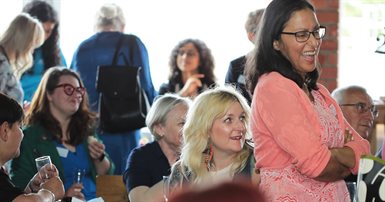Published: 24 May 2022
St George’s celebrated 21 years of our Graduate Entry Medicine programme on Saturday 21 May at an event attended by students and alumni, alongside current and former staff.
Open to graduates from a wide range of science and non-science backgrounds, the Graduate Entry Programme at St George’s offers a fast-track route which condenses the first stage of a conventional medical degree, allowing students to achieve the qualification in four rather than five years.

In the late 1990s when the St George’s leadership team were considering introducing the programme, the concept of a fast-track route into Medicine only existed in some other countries, such as Australia and Canada. At its launch in 2000, the St George’s course was the first of its kind in the UK, accepting graduates not just from scientific backgrounds, but from all disciplines.
The event opened with a panel discussion in The Curve lecture theatre led by our Principal, Professor Jenny Higham. During the discussion, alumni Dr Hannah Barham-Brown and Dr Maya Shahsavari were joined by two of the team involved in establishing the programme, Professor Deborah Bowman and Dr Shehla Baig, and a Final Year St George’s Graduate Entry Medicine student, to reflect on the achievements of the programme and its community. You can read more about our panel members here.
Opening the panel, Professor Higham said: “I came to St George’s six years ago, and its Graduate Entry Medicine programme was one of the things I had heard the most about. It had such an enormously high reputation beyond these walls.”
During the panel discussion, Dr Shehla Baig, who is Director of MBBS Development, said of the early years of the programme: “I think the exceptional thing about this course was we started with a blank sheet of paper and we started from our values. And our values were that it should be active and experiential from the start. And it was important that we kept alive all of that curiosity, humanity and commitment that students bring with them when they want to be a doctor.”
Professor Peter McCrorie and Professor Sir Robert Boyd, who both played a key role in making this unique programme a possibility, were unfortunately unable to attend but shared video messages with guests. Professor Peter McCrorie said: "Twenty-one years ago, I vividly remember the excitement and the fun we had creating a brand-new, first-of-its-kind, innovative programme. We had a very broad mix of students and that’s what made the course what it is. It made for great discussions, where everyone brought their own perspectives.”
Professor Sir Robert Boyd reflected, “I feel very privileged to have had some minor part, but most of the work was done by the fantastic people at St George’s, and then later by the students themselves.” Speaking about the success of the programme at St George’s, he adds: “It had a number of serious advantages. It was independent, flexible and had a high reputation for medical education. It also had some terrific individuals behind the programme.”
Following the panel discussion, guests enjoyed an Afternoon Tea in the Students’ Union bar, where former Dean of Undergraduate Medicine, Professor Sean Hilton, and former Deputy Academic Registrar, Philip Brown, shared their reflections on implementing this ground-breaking programme. Guests also had the opportunity to catch up with friends and meet other members of the programme.
You can read more about the programme and the achievements of its alumni, staff and students here.
To receive a copy of some of our recorded highlights from the event, please get in touch at alumni@sgul.ac.uk.